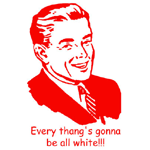By Mark Karlin
TW: I suspect her nostalgia for the 1950s has very little to do with taxes or the size of government at that time, since taxes were far higher and government spending was significant and growing too (and government had always been huge for white people). My guess is that this nostalgic vision of the 50's (or really the pre-1960s, let's be honest) is due to the way in which the country in those days seemed to be so clearly white, protestant, straight, etc, and how the 1960s and 70s confronted the nation with its warts, with its injustices, none of which white America wanted to see. They remember those days fondly because it was before they had to share the notion of Americanness with those who were fundamentally different, racially, culturally, ethnically and so on. It was a time of "innocence" to them, even as it was a time of intense racial terror for millions. That's why the cries of "I want my country back" are so clearly about race, at least in terms of their background noise.
MK: Why does the debate about "big" vs. "small" government today have racial overtones?
TW: Well, simple. Big government was something that was hugely popular, even among white people, right up until the 1960s. In the 30s, whites (including Southern rural whites) loved big government. It saved them during the depression. It gave them rural electricity, jobs, retirement programs, roads, schools, FHA loans, etc. Of course, those big government programs were also mostly if not exclusively for white people: blacks, for instance were largely excluded from them. Indeed their exclusion from the programs had been a precondition for southern senators supporting the New Deal actually. But as soon as people of color gained access to the same programs that whites had always had access to, that is when we discovered our "inner libertarian," and things like government intervention in labor markets or housing markets came to seen as bad, and destructive, and a cause of laziness, etc. It was very convenient. And as social policy and programs to help the have nots and have-lessers became more and more racialized, support for those efforts dropped. In fact, one international comparison found that the factor that most explains why the U.S. doesn't have the kind of social safety nets so common in other western industrialized democracies, is because whites believe black people will abuse the programs if we have them here. Of course, the irony is that then the programs that millions of whites need, especially in times like this, aren't there for them either.
Republicans want to "Keep America America"
Rubio: Entitlements "weakened" us
Teabaggers seek white Christian rule
Stossel: Indians are biggest moochers
Angry white Christians want country back
Why Americans hate welfare
The evidence for teabagger racism


No comments:
Post a Comment